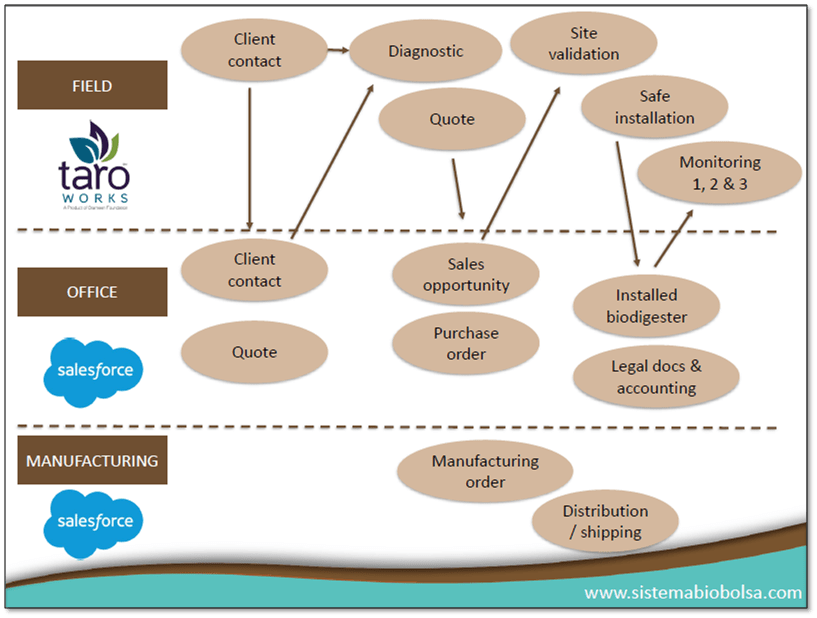
Search
A big thanks to Esther Altorfer for hosting our Offline Mobile CRM Webinar, and sharing how Sistema Biobolsa is using TaroWorks as an offline mobile CRM system to coordinate field staff and manager activities! Read the summary of her presentation below, or click on the video to watch Esther’s full presentation.
Sistema Biobolsa is a social enterprise whose vision is to create value from waste with their biodigestor systems. Farmers throughout rural Mexico and Latin America use these biodigestors to turn farm waste into organic fertilizer, and to replace wood and LP gas with a source of natural energy which saves them money and is better for the environment.
Key to their success is their overall process and methodology for properly installing and maintaining the systems, since they can last for 20 years. The phases for Biobolsa’s interactions with the farmer are as follows:
Throughout this lifecycle, multiple stakeholders must work together including the field agent, central office, credit committee, and manufacturing plants.
They began operations in the central region of Mexico, but have a goal to expand to 250,000 end users on 4 continents by 2021. With so many steps and so many stakeholders, they realized their existing system of paper and Excel wouldn’t be adequate, even to scale to the next region in Mexico.
Sistema Biobolsa’s solution was to implement Salesforce and TaroWorks at the same time, to maintain their processes and reputation, and because the system can easily grow with them as they expand into new countries.
“We needed a comprehensive CRM tool that connects the field team, central office and manufacturing plant. We were looking for a smart, integrated, mobile and digital management platform that would help us maintain high data quality and to be able to share the data immediately through the whole company.” -Esther Altorfer
With Salesforce and TaroWorks in 2016, they’ve successfully expanded to Western Mexico, the Yucatán peninsula, and opened their first international site in Nicaragua. The system allowed them to successfully replicate their model and their processes, and have even improved on them. Here is Esther’s diagram of how interrelated their field and office processes are:

Their processes are very much dependent on communication between multiple stakeholders, and there is much more than just one way data. Data from the field is reviewed by the central office and credit committees before decisions are communicated back to the field agents, and this continues throughout the phases of Sistema Biobolsa’s relationship with the farmers.
For field agents accustomed to working in areas without reception, they’re now finally able to conduct their field activities through a centralized place on their mobile device. They’re also excited to have the latest information from the central database at their fingertips, including farmer contact information, repayment history, and their visit history. The offline maps also help field agents locate biodigestors because the monitors are not always the same person who installed it.
Check out the webinar recording for Esther’s demo!
Sistema Biobolsa now has a record amount of data because they can get information quicker and better. In 2016, they’ve logged close to 2,000 monitoring visits over 14 Mexican states and in Nicaragua. Some of their initial findings include:
Now, as they turn to expanding into even more geographies, they’ll continue to adapt their system to incorporate new languages and currencies. We can’t wait to hear about the other great work they’ll be doing!
POST TOPICS
Sign up to receive emails with TaroWorks news, industry trends and best practices.
TaroWorks, a Grameen Foundation company.
Site by V+V